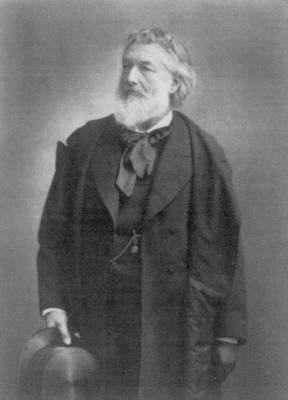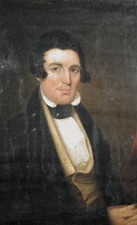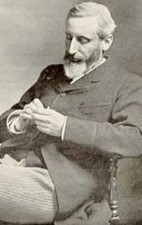
Not many Americans are familiar with President Horace B. Borden. You will find no monuments to him nestled upon the Potomac, nor does his face grace a postage stamp or piece of currency, but his wise policy and incorruptible tenacity of personal conviction led the Union through the troubling times of the Crisis of 1883 and through the harrowing times of the Turko-Bolivian War, a time when Ottoman excursions into Latin America threatened to undermine the Monroe Doctrine and spell peril for American economic interests in the region. Born in a rustic cabin on the shores of the Chapaqueedahadic River, which wound its way through the rich forests of the Appalachian foothills of the North West Territory, Horace Benjamin Borden was raised outside of what would eventually become the city of Peregrine, Montsylvania.
The young Horace grew up on his family’s farm, where he learned the simple virtues of the homespun, down-home life. Old yarns tell of a time when Horace was just eleven years of age and his father brought him a new hatchet with which to do the woodcutting. Showing the intelligence and fortitude which would become his hallmark, Horace went into town and traded the hatchet for a slave named Pete. He then forced Pete to do the woodcutting in his stead. Later, when Horace’s father, Eli Borden, asked the youngster where the hatchet was, Horace replied “I cannot tell a lie, Father, I sold the axe and got me a slave.” At that point, Horace then sicced Pete upon his Father. Eli now dead, Horace ran away into the mountains while a convenient cholera epidemic wiped out the rest of the Borden family and their town, erasing any evidence of Horace’s foul deed.
In 1820, the year before Horace ran away from home, the Territory of Montsylvania became America’s eighteenth state, with its capital in the bustling frontier town of Troyton. Just outside Troyton was Fort Peak, where the newly-formed Montsylvania State Militia was headquartered under command of future Civil War hero Abraham Rubicon Beauregard. In March of 1822, a young and ruddy Horace Borden emerged from his Winter hiding place where he had survived by living in caves and shooting turkeys and bears with his father’s old hunting rifle.
After the hundred-mile trek through the snowcovered mountains of Winter, Horace arrived at Fort Peak where he first met Captain Beauregard and was inducted into the militia at the rank of Whipping Boy, a position which required him to tend to the various whips, cats-onine-tails and harnesses. He also had to whip any prisoners and runaway slaves as well as any random Indians that could be rounded up from the nearby countryside.
When he turned fourteen, Horace was allowed to join the militia as a private and served under Beauregard during the Souichee Slaughter Campaign of 1825-1826, when the gathered State Militias rode from village to village killing any Indians, or slightly brown people, they happened to come across. It would prove to be a strangely serendipitous time for young Horace B. Borden.
On January 14th, 1826, Borden’s group was ambushed at Jimper’s Crossing, a deep gorge on the Calazoona River. Casualties were high in the first few minutes of the fight until Borden was able to wrest the arrow-riddled cap from his Lieutenant’s head and proclaim himself the new leader. With the commander’s sword in hand, Borden was able to rally the troops and lead them to safety in the nearby town of Groper’s Ferry.
There, Borden captured the town’s sole defense, an antiquated five pound cannonade, as well as the town’s gold, which he pocketed. The troops, haggard from battle, helped themselves to the town’s food, whisky and virginal daughters. When the Souichee attacked on the morning of January 16th, Borden surrendered the town, then led his troops secretly outside, sealing the gate behind them. They then set fire to the town so that it could not be captured and left the Indians trapped in the ensuing inferno. Horace Borden then led his troops back to Fort Peak, where they were praised as heroes for their pragmatic triumph at the Battle of Groper’s Ferry.
In the Spring of 1826 Borden used his war spoils to purchase a large tract of land outside Wiltonboro, Montsylvania and was commissioned as a Captain in the new infantry regiment, the 1st Montsylvanian Volunteers of the United States Army, under the command of Colonel Abe Beauregard. While continuing to fight a few minor skirmishes against various Indian groups, Borden built a stately manor house and began to settle into the life of a gentleman farmer. He traveled to New Orleans in the Summer of 1829, where he purchased four slaves and a rider horse at auction. Spending the Winter of 1829-1830 in the balmy bayou air, Borden blended into the society of New Orleans, attending balls and pageants and courting young available ladies.




Above (from left): Horace B. Borden c. 1830, Borden c. 1884, Elizabeth Augusta Borden, General Abe Beauregard
While visiting the plantation of a wealthy planter named Eullis Sutter, Borden became smitten with Sutter’s fourteen year old niece, Sally Mae Henders. After being married in June of 1830, Horace, Sally and their six slaves, two of whom were a wedding gift from Eullis, journeyed back upriver to Sutcher’s Landing, site of Borden’s austere plantation in Wilton County, Montsylvania.
The next few Autumns were profitable and Sutcher’s Landing grew large and ornate. A new home, more fitting a man of wealth and means was built and the Borden family prospered and multiplied. Sally bore three sons; Chester Adolph Borden, Kermit Wethersfield Borden, and Rutherford Ogden Borden. Two daughters also complemented the household; Lilly Bella Borden and Adeline Buella Borden. Adeline, the youngest, was also the last of the union’s productions, for in her birth Sally Mae Borden died in December of 1838.
His wife dead, twenty-seven year old Horace left Sutcher’s Landing, his children under the rule of a governess, and traveled to the newly-christened state capital of Bestoria, a city founded in 1830 and named for Revolutionary War hero Samuel Bester. While in Bestoria, Borden took it upon himself to study law and in 1840 was appointed by Governor Zachary Hull to the post of Secretary of the Treasury of the Free State of Montsylvania, where he oversaw the State’s banking and financial matters. Living well above his means with income from unknown sources, Borden took to a life of leisure while serving in the State government. He particularly enjoyed the city’s plethora of brothels, gambling halls, public houses and domiciles of ill repute. Although his political opponents brought up insubstantial accusations of fraud, graft and corruption, they all met with untimely and
mysterious accidents before Borden could ever be indicted and Borden fast became one of Hull’s most favored and trusted of advisors.
Borden served in the State government until 1846, when his old mentor Abe Beauregard wrote to invite him on a grand expedition across the Rio Grande to take on the mighty Mexican Army. Eager for more violent escapades, Horace journeyed to San Antonio with three of his best horses, ready for adventure. There, Beauregard, now a Major General, put his old protege in command of the 21st New York, a regiment with a noble and courageous history in battle. Now a full colonel, Borden went down to the steamy and smoky battlefields of the Mexican-American War where, at the Battle of Texaco Ridge, his scouts captured renowned Mexican General Louis de la Luna Baptiste and demanded an enormous ransom from the general’s wealthy family.
Unfortunately for Baptiste’s family, Borden had already shot the General during a particularly heated game of bridge over accusations of cheating. The death notwithstanding, Borden collected the gold and with a few of his favorite staff officers took up residence in a coastal villa for the remainder of the war. His troops were left alone and found their way to the army of General Winfield Scott who was able, with the extra men provided by Borden’s absence, to defeat the Mexicans and gain a crucial victory for the United States.
After the war, Horace B. Borden returned to Sutcher’s Landing by way of Bestoria, where he became betrothed to Elizabeth Augusta Beauregard, youngest daughter of General Abraham Beauregard, who in 1848 succeeded Zachary Hull as governor of Montsylvania. Borden, in that same year, gave control of Sutcher’s Landing to his eldest son Chester, who had just reached his majority. Borden moved the rest of the family to Prixby Place, a palatial residence in Old Bestoria. Beauregard made his son-in-law Lieutenant Governor that same year.
In 1849 Alexander Hull, son of former governor Zachary Hull joined with Martin Treecher Bester and Horace B. Borden to form the State Financial Company as a means of distributing money and political favors throughout the state. The year 1852 brought both sorrow and joy for Borden with the birth of his fourth son, Grady Wedgewood Borden and the death of longtime associate Governor Abraham Beauregard. Beauregard, who was a major contender for the Democratic candidacy in the 1852 election, had been shot and killed in a duel by Borden’s own son Chester who claimed that he mistook the sound “three” for the sound “ten” in the heat of the moment.
Although the details of the duel’s origin have been lost to the mists of time, it is believed to have begun when Beauregard called Chester a “useless, lazy drunken layabout.” While Chester was tried and convicted by a jury of twelve men good and true, his father, now Governor of Montsylvania pardoned him for all crimes. Horace B. Borden’s gubernatorial administration held a conservative viewpoint as the growing tension over the issue of slavery began to rock the Republic. Using a clever strategy of blackmail against President Millard Fillmore, Borden was able to force vetoes against any legislation which limited the expansion or extension of slavery within the bounds of Montsylvania or propose tariffs against Montsylvanian merchants. Making Hull and Bester Senators, Borden surrounded himself with a group of like-minded politicians and set up a close-knit committee to run all aspects of the political and economic machines of Montsylvanian life.
In 1860 the shots at Fort Sumter began the Untied States Civil War and Governor Horace B. Borden reacted with his characteristic skill, putting forth a bill before the State Senate proposing that Montsylvania remain neutral throughout the conflict while simultaneously selling both sides as many arms and as much ammunition as they could pay for in gold. Despite the bribes offered, the State Senate voted down Borden’s bill and chose instead to join the confederacy. Outraged over the betrayal, Borden resigned as governor and accepted James Buchanan’s offer of a commission as General in the Union Army. Although Borden was a slave-owner, he joined the Union feeling that they more accurately reflected his own ideological views that Generals should be well-paid.
Lieutenant General Borden served on McClellan’s staff in the early part of the war, before accepting a promotion to Major General and command of the Army of the Western Territories. Although there were very few Confederates in the West, Borden and his men refused to remain idle, choosing instead to launch campaigns against various Indian tribes and Mormon settlements. Eventually, Borden led a short invasion of Canada where he was able to raid many towns and steal a great deal of war booty. In 1864, Borden left his command under his subordinate, General James Hull, brother of Confederate Senator Alexander Hull and journeyed to Georgia to take part in Sherman’s infamous March to the Sea. There, he convinced Sherman to ignore the Confederate Armory and Banks in Augusta, where Borden’s brother-in-law owned a profitable series of cotton mills and powder works. Heeding his advice, Sherman instead burned Atlanta, ignored Augusta and captured Savannah in December of 1864.
When Robert E. Lee surrendered at Appomattox Courthouse on April 9th, 1865, Borden found himself at a spiritual crossroads, without either a military command or political office. So, in the Winter of 1865, after a few long months of drunkenness, Horace Borden boarded a steamer bound for Africa and found himself in Capetown, where he invested a small fortune in a new shipping company, partnered with the South African governor Sir Lionel Douglas Beas.
The company grew and in 1870 was able to finance the expeditions of British clergyman Cecil Rhodes who set up a diamond mine in the Kimberly fields in the early 1870s. With Borden’s financial wizardry, Rhodes was able to create the DeBeers Diamond company and provide funding for Borden’s eventual run for the U.S. Presidency.
In 1878, Borden returned to the United States and once again set up residence in Bestoria, Montsylvania. It was then that he began to plot a course of action that would guide him for the rest of his life. With a constant supply of money coming in from his African ventures he was able to invest in cattle ranching in the newly opened up territories of the West and was also able to purchase a major share of stock in the new Montsylvania-Pacific Railroad Corporation.
With money from many diverse and untraceable sources, Borden was able to convince the leaders of the Republican Party to award him the Presidential nomination in 1880. In a whirlwind campaign, Horace B. Borden was able to defeat James A. Garfield who, at the eve of the election day, was assassinated by Charles Guiteau, a prominent Washington D.C. lawyer, who as mere coincidence was employed within the legal department of one of Borden’s companies.
On March 4th, 1881, Horace B. Borden was inaugurated as the twenty-third President of the United States of America. Within weeks of taking office, Borden worked at a feverish pitch to surround himself by trusted political allies; his Vice-President Alexander Hull, Secretary of State Martin Bester, Secretary of War Stephen J. Hampton, Secretary of the Treasury Chester Borden and Attorney General Alistair Hayes.
The Borden Administration oversaw the Gilded Age, a time of decadence and splendor, as well as a time of fiscal chaos, culminating in the Crisis of 1883. The Crisis began in March, when independent auditors noticed that the 2.4 million dollars allocated for the new railroad and canal system, to be supervised by the Montsylvania-Pacific Railroad Company, had gone missing. The President, using sound judgment, dismissed both the accusations and the auditors and instead focused on providing sound economic security for the Nation and especially for its leaders.

When the Turko-Bolivian War broke out in 1884 over the independence of Cosa Nostra, a small Latin American nation, President Borden insisted upon sending U.S. Marines to the area to support the fledgling nation and to defend the interests of American businessmen who had set up plantations in the area. When revolutionary leaders Tandy Bernando and Onve Lopez succeeded in ousting the Turkish Expeditionary Force, Borden was quick to recognize their new government and extend the hand of friendship to Cosa Nostra, a land of rich culture and excellent agricultural yields.
In 1884, Horace Borden chose not to run for election, and instead bowed to his successor Chester A. Arthur, a man of dignity and tact who possessed not only intelligence and cunning, but also possessed a great deal of information concerning Borden’s financial records. Retiring from office, Borden returned with his wife Elizabeth to Montsylvania, where he continued his financial and business ventures until his death from dropsy in 1903. He was buried in Wilton County Cemetery, next to his eldest sons Chester, Kermit and Rutherford, each of whom had died under mysterious and yet-unexplained circumstances, and his first wife Sally Mae Borden. His youngest son, Grady Borden took over the family’s financial empire that same year and continued his father’s work.
Throughout his long and productive life, Horace B. Borden had been both a dirt poor farmer and a wealthy Robber Barron. His service to his country in numerous wars and his loyalty to the United States serve as a fine example for all Americans. Through his various schemes, power plays and machinations he proved that any American, no matter how poor or humble his beginnings, can with luck, skill and bribery fulfill the American dream.

Is there a way to become a content writer for the site?